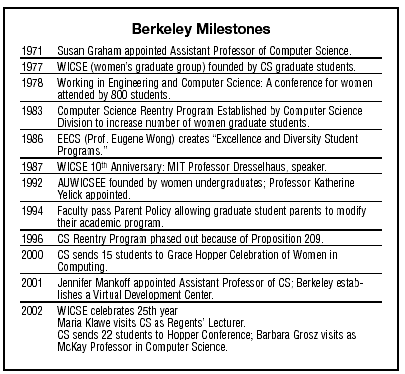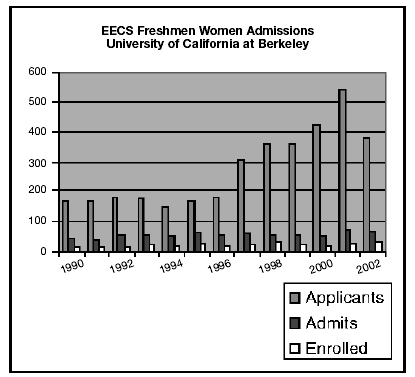THIS IS AN ARCHIVED VERSION OF CRA'S WEBSITE. THIS ARCHIVE IS AVAILABLE TO PROVIDE HISTORICAL CONTENT.
PLEASE VISIT HTTP://WWW.CRA.ORG FOR THE LATEST INFORMATION
| About CRA |
| Membership |
| CRA for Students |
| CRA for Faculty |
| CRA-Women |
| Computing Community Consortium (CCC) |
| Awards |
| Projects |
| Events |
| Jobs |
| Government Affairs |
| Computing Research Policy Blog |
| Publications |
| Data & Resources |
| CRA Bulletin |
| What's New |
| Contact |
| Home |
Back to November 2002 CRN Table of Contents
[Published originally in the November 2002 edition of Computing Research News, Vol. 14/No. 5, pp. 2, 7.]
Expanding the Pipeline
Award Validates Berkeley's Diversity Programs
By Sheila Humphreys
Berkeley's "EECS Excellence and Diversity Student Programs" were recently awarded the 2002 Women in Engineering Programs Award (WIEP) by WEPAN (Women in Engineering Programs and Advocacy Network).
At a time when diversity programs are under attack, such an award validates Berkeley's programs for women. The passage of Proposition 209 in California, which prohibits programs that confer educational benefits based solely on gender or ethnicity, has led to a perceived shift away from valuing diversity. Further, the continuing economic downturn in California undermines all academic programs, but particularly diversity programs, which lie outside core instructional activities.
The WIEP Award recognizes Berkeley's "sustained national impact" in several areas, including: 1) attracting women to electrical engineering and computer science at Berkeley; 2) providing orientation and sustained academic support to women students in EECS; 3) fostering a sense of community for undergraduates and graduate women; 4) encouraging undergraduate women to apply for graduate programs through research; 5) conducting outreach to pre-college women; and 6) developing new policies to serve women students. In this article, we limit the discussion to our efforts and successes in fostering a sense of community and engaging undergraduate women and minorities in research.
Background
The box below shows highlights of the EECS women's programs, from the appointment of Professor Susan Graham in 1971 to the formal creation of a diversity program in 1986 by Professor Eugene Wong, and now the 25th anniversary of our women's graduate group WICSE this year. Our programs have been greatly enriched by synergy with all of CRA-W's programs, including research programs DMP, CREW, and the Distinguished Lecturer Series, as well as the Hopper and Tapia Conferences and CRA's Outstanding Undergraduate Awards and Career Mentoring Workshops.

Fostering Community: WICSE and the Alumnae Connection
Twenty-five years ago a group of women students founded the graduate group WICSE (Women in Computer Science and Engineering), which continues to form the cornerstone of our programs for graduate women. The effectiveness of WICSE derives in part from its continuity, departmental support, and meaningful contact with CS alumnae and other prominent women in CS. The EECS Department provides WICSE with staff assistance, space, facilitation of conference travel, a guaranteed voice at the annual Faculty Retreat, and funding to support its activities.
Since 1977, WICSE has helped to organize six major conferences for women in CS and engineering. WICSE members have been active at each of the four Grace Hopper conferences, their numbers increasing from seven in 1994 to 22 who attended the 2002 conference in Vancouver. WICSE guest speakers over the past three years have brought our students in contact with women at the forefront of CS. Past speakers include Ruzena Baczsy, Fran Berman, Susan Eggers, Deborah Estrin, Barbara Liskov, Maria Klawe, Valerie Taylor, and Tandy Warnow, among others.
Recently, we followed up on our women CS Ph.D.s for the purpose of raising our students' awareness of them. Of the 137 alumnae respondents, 50 are teaching in research universities. Berkeley CS graduates hold tenured and tenure-track positions in most major programs, including Harvard, Carnegie Mellon, MIT, Stanford, UIUC, Washington, Wisconsin, UC Berkeley, UC Davis, UCLA, UC Irvine, University of Illinois, Georgia Tech, Northwestern, and UT Austin. An updated web page with links to these alumnae provides a virtual network for the Berkeley students aspiring to follow their path.
WICSE's core activity is a weekly lunch meeting, which ensures that women students gather on a regular basis. AUWICSEE, the Association of Undergraduate Women in Computer Science and Engineering, was established 10 years ago. A Mentoring Lunch is held once a month for WICSE and AUWICSEE to meet together. New policies have been one result of regular gatherings of women students. For example, in the mid-'90s a number of women graduate students struggled with graduate degree timelines and expectations while dealing with infant care. The Parent Policy, championed by WICSE members at a CS Faculty Retreat, was first adopted by our faculty and later by the entire Berkeley campus. This policy provides a safety net for graduate students who are parents, allowing them the flexibility of slowing down their degree progress without losing financial aid or research momentum.
Undergraduate Research Programs
When the Computer Science Reentry Program was unfortunately phased out in 1996 due to Proposition 209, alternative means of bringing more women into graduate study had to be considered. Thus, we initiated new programs to encourage undergraduate women to engage in research. A series of workshops was created to address basic issues of how to find academic-year and summer research, approach faculty to ask for research, develop a project, and present research. We instituted undergraduate research poster sessions, now scheduled each semester, and enthusiastically advertised NSF Research Experiences for Undergraduates Programs, as well as the CRA-W DMP and CREW programs. One of our DMP students, Emily Chung, received Honorable Mention in the CRA Outstanding Undergraduate competition in 2001.
Focus on Minorities
Since 1990, EECS has operated a summer research program, SUPERB-IT (Summer Undergraduate Program in Engineering Research at Berkeley-Information Technology). A minority-serving program, the goal of SUPERB is to develop competitively qualified graduate applicants through undergraduate research. Founded by our own African American EECS graduate students, SUPERB has been supported by the NSF REU Program. Ours is one of the very few REU sites focusing on underrepresented students. Of students in the SUPERB program, 41 percent are women, compared with an 18 percent enrollment of undergraduate women in the EECS Department. African Americans have comprised almost half of our REU students, and more than 20 percent come from underrepresented institutions. Cited by NSF as an "exemplary program," SUPERB has brought 113 students to Berkeley since 1990. They joined CS and EE graduate research groups, with mentorship provided by faculty and graduate student researchers.
Leveraging Summer Research
Results are clearly positive: 66 percent of former SUPERB students have pursued a graduate degree. The positive correlation between undergraduate research and the pursuit of graduate degrees in science and engineering is well known. Since 1990, 113 students participated in SUPERB and have been mentored by 56 EECS faculty. Of these students, 78 percent were underrepresented ethnic minorities. Four SUPERB alumni have received doctorates as well as MS degrees, and nine doctorates are pending just at Berkeley. SUPERB has contributed significantly to the diversity of the graduate student body both here and elsewhere. SUPERB continues to bring women and minority students to our graduate program. Five of the women entering our graduate program in 2001 and 2002 are SUPERB alumnae, including a student from Howard University.
Changing the Climate
A longstanding program like SUPERB has a positive effect on the departmental climate. In 1990, matching students to faculty research groups was difficult; now, after 12 years, CS faculty are receptive to SUPERB students. Fifty percent of the faculty who have mentored SUPERB students are repeaters, attesting to their enthusiasm for the program. Both graduate students and faculty have discovered talented students from universities unfamiliar to them. Further, two women students from two other nearby institutions have continued their research with their Berkeley faculty during their senior year.
Giving CS a Context: The Berkeley Virtual Development Center
Our newest program for women is the Virtual Development Center (VDC) established by EECS in January 2001 in partnership with the Institute for Women and Technology. Our VDC focuses on the technology needs of disabled women. The motivation to create such a center is to offer to students, especially women, a needed context for understanding the applications of their theoretical studies.
The VDC course "User Interface Design and Development" was taught by CS Professor James Landay. About 40 percent of the students enrolled in this class in spring 2002 were women, a much higher ratio of women to men in CS classes. The students used contextual inquiry methods to solicit input from a group of disabled women from the community; they brainstormed with that community about what technology products would be useful to them. Twelve teams of students developed innovative projects, which are posted at: http://guir.berkeley.edu./courses/cs160/spring2002/projects.htm
Students commented on the value of directly connecting the special users' needs to the design process, instigated by the VDC's focus. One student wrote:
I really feel that designing for the disabled teaches a lot more about other people, and it really teaches about good user-centered design since the designers can't shoot from the hip and use their own experience, but rely more upon the user's feedback.
The Admissions Bottleneck
Contrary to popular opinion, it is not lack of interest in CS by talented high school women that presents a serious challenge, impeding our efforts to diversify the computer science pipeline. Rather, it is the difficulty they face in gaining admission to UC Berkeley. The table below shows how the number of freshmen applicants who are women has hovered around 350 for the past five years, with a fairly constant number of women admitted. The selectivity is so high that only 19 percent of freshman applicants were admitted in fall of 2002. Our 45 percent yield rate (admitted students who choose to enroll at Berkeley) reflects effective recruitment. Although the percentage of undergraduate women enrolled in EECS has slowly crept to 18 percent, this percentage will not increase significantly unless more applicants gain admission. In seeking to broaden the definition of qualified applicants, a group of faculty and staff lobbied to remove from consideration the criterion of "prior computing experience," since it affects women applicants disproportionately. Other CS programs, for example at Carnegie Mellon University, have investigated broader admissions criteria with very positive results.

Sheila Humphreys (humphrys@eecs.berkeley.edu) is Academic Coordinator for Student Matters, Center for Undergraduate Matters, Department of Electrical Engineering and Computer Sciences, University of California at Berkeley.
Copyright © 2007 Computing Research Association. All Rights Reserved. Questions? E-mail: webmaster@cra.org.
